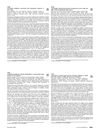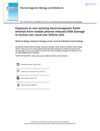48 citations,
September 2020 in “Frontiers in Immunology” Loss of OGG1 increases skin inflammation and auto-antibodies in lupus.
 28 citations,
January 2017 in “Critical Reviews in Therapeutic Drug Carrier Systems”
28 citations,
January 2017 in “Critical Reviews in Therapeutic Drug Carrier Systems” Nanomaterials in biomedicine can improve treatments but may have risks like toxicity, needing more safety research.
 2 citations,
March 2022 in “Journal of Personalized Medicine”
2 citations,
March 2022 in “Journal of Personalized Medicine” Personalized medicine is important for treating skin disorders, with new treatments and connections to hormones and genetics being explored.
 August 2024 in “Applied Sciences”
August 2024 in “Applied Sciences” Plant extracts may help prevent or reverse hair graying.
 January 2024 in “Current research in toxicology”
January 2024 in “Current research in toxicology” Thallium is highly toxic, causing severe health issues, and Prussian blue is the best antidote.
 215 citations,
March 2018 in “Archives of Toxicology”
215 citations,
March 2018 in “Archives of Toxicology” Tiny pollution particles called PM2.5 can harm skin cells by causing stress, damage to cell parts, and cell death.
 August 2018 in “Journal of The American Academy of Dermatology”
August 2018 in “Journal of The American Academy of Dermatology” Infant skin cells may be less capable of repairing UV-induced DNA damage than adult cells.
 25 citations,
April 2018 in “Electromagnetic biology and medicine”
25 citations,
April 2018 in “Electromagnetic biology and medicine” Mobile phone radiation may cause DNA damage in human ear hair follicle cells.
 10 citations,
May 2012 in “PloS one”
10 citations,
May 2012 in “PloS one” Low ERCC3 gene activity is linked to non-pigmented hair growth.
 5 citations,
December 2011 in “InTech eBooks”
5 citations,
December 2011 in “InTech eBooks” Eat antioxidant-rich foods, reduce fast food, and explore various treatments for vitiligo.
 March 2024 in “Journal of Microbiology and Biotechnology”
March 2024 in “Journal of Microbiology and Biotechnology” Phloroglucinol may help improve hair loss by promoting hair growth and reducing oxidative stress.
 November 2023 in “Frontiers in cell and developmental biology”
November 2023 in “Frontiers in cell and developmental biology” Hair aging is caused by stress, hormones, inflammation, and DNA damage affecting hair growth and color.
 August 2018 in “Journal of The American Academy of Dermatology”
August 2018 in “Journal of The American Academy of Dermatology” Hair loss in twins may be linked to family history of hair loss, high blood pressure, heart disease, and possibly anxiety, but more research is needed.
10 citations,
September 2022 in “Journal of Biophotonics” Blue light therapy is safe for skin and may protect against UV radiation.
6 citations,
March 2022 in “International journal of molecular sciences” Natural skincare products may help reduce sun damage and support the skin's daily cycle.

Intermittent fasting slows hair growth by damaging hair follicle cells.
 September 2022 in “International Journal of Health Sciences (IJHS)”
September 2022 in “International Journal of Health Sciences (IJHS)” Low zinc levels may contribute to hair loss due to increased oxidative DNA damage.













